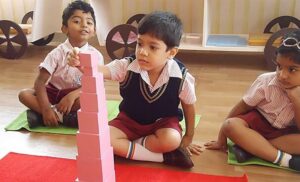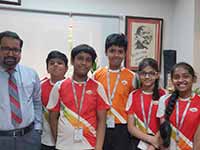Download our FREE Academic Calendar now! 📚 Start your child’s journey to success.
Many schools and educational institutes today have adopted the project based way of learning because of its ability to give students an opportunity to engage in activities/projects that foster development of knowledge and skills.
Project-based learning (PBL) is not just doing a project, it is learning to try every possible solution to a given challenge one may face in the real world. Students, with this approach, learn to think, imbibe, implement and execute solutions that are practical and sustainable in the long run.
Why use Project-based learning in academics?
The answer is that today’s work requires a lot of practical implementation and our students must possess abilities that help them in carrying out these tasks smoothly. The PBL approach helps in developing 21st century learning skills like teamwork and problem solving skills, along with effective communication and collaboration. This approach gives the students simulation of real world challenges and makes them industry ready.
What are the Elements of Project-based Learning (PBL)?
Today, there are several factors that lead to successful outcomes in students who have followed the PBL approach over a continuous period of time. The approach here has many essential components that form the crux of the learning:
1. Students isolate the challenge/question/problem to research and respond/resolve. This allows them to view the problem statement closely and initiate an inquiry process that helps them in creating a viable solution for implementation.
2. Tests students’ existing knowledge and understanding, and how they are able to use it in respect to the challenge.
3. Involves inquiry based methods, and establishes real world connections through exploration and in depth questioning.
4. Use of latest technology and skills.
5. Fosters self-discretion. Students learn to reflect upon the choices made and decide whether they are working or not.
6. Feedback and revision form an integral part of the process.
7. Through research of facts and methods is a must.
8. Presentation of the problem in front of peers for review and constructive criticism.
What are the Benefits of Project-based Learning?
1. Encourages students to venture out of the traditional learning set up and meet challenges like one would do in a real world set up similar to professionals working every day.
2. Enhances Interpersonal Skills like teamwork and project management.
3. Improves 4Cs: Collaboration, Confidence, Creative, and Critical thinking skills.
4. Helps in determining actual knowledge and skills. Students engage with the content in a way that enables lifelong retention of the skills and knowledge acquired in the process.
5. Students master various skills with completion of each project.
6. Better student-teacher and peer interaction as all the stakeholders work in sync with each other.
7. Gain valuable career insights.
8. For teachers, the PBL method holds the ability to expand their repertory of methodologies/pedagogies and offer increased job satisfaction.
How is the PBL Approach included in academics at GIIS Noida?
Project-based learning is an integral part of academics at GIIS Noida and is seamlessly integrated into the curriculum to enable students to produce authentic assignments, experience real world challenges, and learn something new and exciting beyond the four walls of the classroom.
This approach is practiced regularly so that the students learn to collaborate, learn and research their own solutions and become future ready global citizens. It not only aids their self-learning process, but also helps them in developing skills that form the basis of a successful life both personally and professionally.









!['s_Career_Prospects_through_Primary_Education_Opportunities[1]](https://giis.deweyolivia.work/noida/wp-content/uploads/sites/27/2024/12/Enhance_Your_Childs_Career_Prospects_through_Primary_Education_Opportunities1-300x169.png)



























